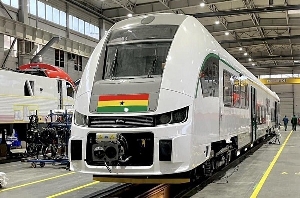General News of Thursday, 3 October 2019
Source: www.ghanaweb.com
Police, military can’t tell journalists what to do – NMC chairman
The rising spate of attacks on media personalities, even though has received major backlash from various concerned stakeholders, has once again been described as abominable and unjustifiable.
In the last decade, the recorded number of attacks launched on journalists by some political figures and law enforcers have been alarming, a situation which has called for open condemnation by successive governments.
These attacks have adversely impacted on Ghana's press freedom ranking.
On the back of this, the Chairman of the National Media Commission, Yaw Boadu-Ayeboafoh, has said that it is not part of the duties of law enforcers to demarcate the limits of journalists in the line of their duties.
He said any such attempts by the police or the military to dictate to media practitioners what to do or how to do their work can be classified as unlawful under the 1992 Constitution of Ghana.
Yaw Boadu-Ayeboafoh, speaking at the 2nd public lecture of the GJA’s 70th anniversary celebration said Journalists have extra rights as part of their individual rights as citizens in the country, to analyse and report what they see and experience.
Therefore, any obstruction by law enforcement agencies as has been in the past, is unconstitutional.
Several attempts by military and police officers in the past to interfere in the work of journalists have turned sour. Typical are the cases involving Victor Kwawukume of Daily Graphic’s Victor Kwawukume, who lost his sense of smell as a result of police brutalities while covering a swoop on criminals in Ho. Latif Iddrisu Latif Iddrisu of Multimedia, was left with a fractured skull by police while covering an assignment at the Police Headquarters in Accra.
Quoting relevant parts of the 1992 constitution to further explain his stance, he emphasized that “Article 200 Clause 1 and 3, provide for the establishment and functions of the Ghana Police Service, whilst Article 210 clause 1 and 3 provide for the existence and operation of the Ghana Armed Forces.”
“Further, Article 41 (i) charges Ghanaians including journalists with duties and responsibilities indicating that -the exercise and enjoyment of rights and freedoms is inseparable from the performance of duties and obligations and accordingly it shall be the duty of every citizen to cooperate with lawful agencies in the maintenance of law and order-”
He continued that, “Even though this provision enjoins us to cooperate with them, nowhere is it provided that the police and military are to define the limits of freedom and independence of the media.”
“..Our rights to gather information, our rights to process information and our rights to disseminate information is an additional right outside that of the rights provided the ordinary citizens of this country,” Mr Boadu-Ayeboafoh added.
Recounting the changing phases of journalism and the attacks by several law enforcers and political figures, he noted that the media today has grown to be more responsible and tolerant in the face of such attacks.
Adding that the media has played very pivotal roles in the developmental journey of the country.
Media attacks not entirely besiegement
In the same vein, however, Mr Boadu-Ayeboafoh argued that in the midst of the series of attacks on the media it would be unfair to infer that the media is under siege.
He said that being under siege - which translates as the inability to operate or act freely due to restrictions - would have rendered media personalities incapacitated in the gathering, processing and the dissemination of information.
Therefore, acknowledging that the media is under attack better explains the current status of the Ghanaian media.
"I think that if you say that media has come under attack, it is different from suggesting that the media have been besieged. Indeed, if you are besieged you have been so incapacitated that you are unable to defend yourself…so whiles admitting that there have been attacks on the media, that all of these attacks are unwarranted in the face of the legal regime that we are operating where there is a guarantee of media freedom, it cannot be sustained under any circumstances”
"But does that mean that we are besieged? If we are besieged we will not be able to tell some of the stories that we have been telling about the brutalities that have been meted out to us".













